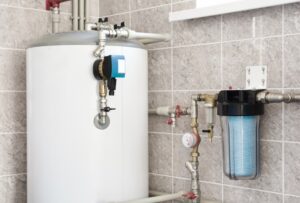If you have a tank water heater in your home, then you can probably understand why excessive water pressure would be a problem. While it’s extremely rare for a water heater to blow up, excessive water pressure can and does lead to corrosion and leaks that are fatal for the system, and also leave you with a headache of a mess and probably property damage to deal with too.
Nobody wants gallons of water seeping through their garage or living space because of a water heater that built up too much pressure. So, how do you avoid this? Well, the answer is simple–by scheduling routine water heater maintenance. This allows our professionals to check 1. a very important component called the anode rod and 2. if your water heater has a scaling problem.
Read on to learn more!
The Sacrificial Anode Rod
Referred to as the “sacrificial” anode rod, this component has a very important job. It is composed of magnesium, and it is designed to absorb rust that would otherwise impact the metal lining of your water heater tank. The reason it’s made of magnesium is that this breaks down faster than steel, which is what your water heater tank is made out of.
The rod functions by reacting to the corrosive elements that are in your water. So, the tank itself is protected. Since the rod breaks down over time, this means it doesn’t last forever. It has to be replaced on occasion, and we check to see it’s status during your maintenance appointments.
If the anode rod is left for too long, not only do you risk corrosion finding the lining of the water heater tank, but it also creates an imbalance of pressure within the water heater, which you may not know about until you start seeing leakage–we don’t want it to get this far!
Your Water Heater and Scaling
Scaling is something that happens as a result of hard water. This is, water with a high level of minerals in it–namely calcium, magnesium, and sometimes iron. These minerals are harmless to ingest, but they are bad news for your plumbing system, and your water heater is included.
Scaling settles on the bottom of your water heater, and can coat the heat exchangers, preventing them from effectively or efficiently doing their job. They can also clog up the input and output lines of your water heater, which, again, creates pressure.
Schedule Maintenance with Our Team
There is a pressure gauge on your water heater, and we encourage you to keep an eye on this. If you notice the pressure is rising, please give us a call so we can assess the situation. Ultimately though, the best way to avoid this problem to begin with is by having our professionals closely inspect your water heater and potentially flush the sediment out once a year. Please don’t hesitate to contact us with any questions you might have!
Reach out to Covenant Heating and Cooling for quality Nashville, TN water heater services. We are “Dedicated to the Promise of Serving You!”

